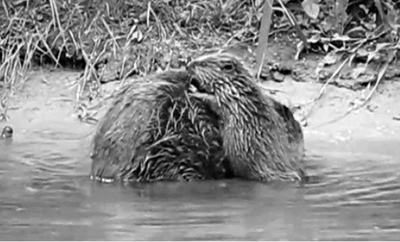Biodiversity Policy Guide
Biodiversity
Halting the Sixth Mass Extinction Event
(Imported from 2014 Policy Guide leaflet, downloadable as PDF here)

Beaver Kits Born in Devon, July 2014. A sight not seen in England for Centuries
The issue of biodiversity is central to the British identity. Since the earliest days of television, the
wildlife documentary has captured our imaginations and fired up our zeal for protecting the natural
world. It is important to recognise the value of both individual species and whole ecologies and
protect them accordingly.
Lib Dem Policy Papers:
(Links from Mark Pack's archive of official Liberal Democrat policy papers.)
(A very important health warning applies to the contents of these policy papers. They are the policy papers proposed to Liberal Democrat conferences. The motions to conference endorsing the policy papers may have been amended, referred back or even defeated. The contents of policy papers may also have subsequently been changed by further policy papers, motions or other decisions by the Liberal Democrat policy-making process. This list also does not include papers containing policy which have, for example, gone to Scottish or Welsh Lib Dem conferences.)
PP26 Living in the Greenhouse, Policies to Tackle Climate Change, (pub. 1997)
PP26 @ LibDem website (needs a login)
5.0.7: Biodiversity. Countryside protection policies need to adapt to the increasing number of species placed at risk from climate change. The reform of the CAP which Liberal Democrats envisage would ensure that increased resources became available for the protection of rare species and habitats. Legal protection for vulnerable areas also needs to be strengthened.
PP31 Keeping the Balance, Policies on Genetic Modification, (pub. 1999)
PP32 @ LibDem website (needs a login)
5.2.5 includes: We call for: a) All countries to sign the Convention on Biological Diversity, and for it to be given effective enforcement powers. b) Issues concerning TRIPS and genetic patenting to be reviewed as part of the WTO 'Millennium Round'
PP52 Rural Futures, (pub. 2002)
4.0 The Liberal Democrats are developing integrated policies to ensure truly sustainable and flourishing farming and land use for strong local communities, and a healthy, unpolluted, safe and biodiverse environment for those who live in and visit the countryside. 4.7.3 The Liberal Democrats call for a National Pesticide Reduction Strategy, with clear targets for reduction in usage and encourage local authorities to draw up Pesticide Reduction strategies.
PP93 Our Natural Heritage, Policies on the Natural Environment, (pub. 2009)
1.0.1: Whether it's the rolling green hills of our rural landscape or the diversity of wildlife in an urban garden, Liberal Democrats recognise that a healthy natural environment is crucial to our quality of life.
PP102 A New Purpose For Politics: Quality of Life (pub. 2011)
5.6.3: Appropriate consideration for facilities such as local nature reserves and wildlife corridors
PP109 Green Growth and Green Jobs: Transition to a Zero Carbon Britain (pub. 2013)
5.2.1 Biomass lends itself most readily to smaller scale domestic and industrial use, using material derived from the local landscape, such as roadside and habitat management for biodiversity conservation. From 2020 support from the Renewable Heat Incentive should be given only to these kinds of supplies.
PP113 Prosperous, Sustainable and Secure: Renewing the European Union for the 21st Century (pub 2013)
5.2.16 Liberal Democrats endorse support for rural communities and businesses through
the CAP, particularly those in upland and less favoured areas, specifically in order to
protect and enhance biodiversity, landscape and heritage, water management and local
economic activity including tourism.
Challenge Magazine:
2007 Winter p1 The Forgotten Crisis
2008 Spring p2 The New Green Agenda Is Mental
2008 Summer p1 Mainstreaming Environmental Action
2008 Autumn p18 What Will The Next War Be About?
2009 Summer p4 A Local Green Way Out Of Recession
2009 Autumn p5 A Green Tick for the Libdems,
p7 Our Natural Heritage, The Verdict
p10 Campaigning for the Natural Environment
2010 Summer p14 Keeping the Swifts Flying
2010 Winter p6 Biodiversity The Hidden Threat To Us All
2011 Spring p21 Save Our Wood
2011 Summer p21 Silent Forests
2011 Autumn p12 Lost Pride
2012 Summer p19 A Sustainable Future For Fish
2012 Autumn p12 The wings to fly: Prioritising Biodiversity,
p18 Reserve Judgment
2013 Spring p6 Farming Floods and Forests,
p22 First Step
2013 Summer p12 Pfffff! Dolphins and Whales,
p22 Bees in Crisis
2013 Winter p18 Alien Invasion
2014 Spring p11 Speculating on Extinction
2014 Summer p10 Global Sanctuary
Resources:
The Wildlife Trusts Biodiversity Benchmark
http://www.wildlifetrusts.org/biodiversitybenchmark
Cambridge and Peterborough Biodiversity Partnership
http://www.cpbiodiversity.org.uk/
The Convention on Biological Diversity
http://www.cbd.int/
UN Decade on Biodiversity
http://www.decadeonbiodiversity.net/
The Economics of Ecosystems and Biodiversity
http://www.teebweb.org/
Natural England
http://www.naturalengland.org.uk/
The Natural History Museum
http://www.nhm.ac.uk/natureonline/biodiversity/
DEFRA UK BAP site
http://jncc.defra.gov.uk/default.aspx?page=5155
The National Biodiversity Network
http://www.nbn.org.uk/
The Biodiversity Planning Toolkit
http://www.biodiversityplanningtoolkit.com/
The Forum for the Future Sustainable Cities Index
http://www.forumforthefuture.org/project/sustainablecitiesindex/overview